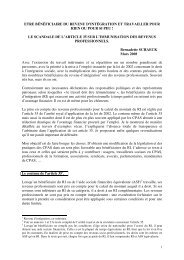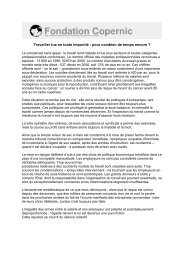Awra Amba RJ 300612 EN - Contacter un comité local d'Attac
Awra Amba RJ 300612 EN - Contacter un comité local d'Attac
Awra Amba RJ 300612 EN - Contacter un comité local d'Attac
Create successful ePaper yourself
Turn your PDF publications into a flip-book with our unique Google optimized e-Paper software.
<strong>Awra</strong> <strong>Amba</strong>, a current experiment of utopian socialism<br />
2007, as the report was published in March, 2008. This survey has used a questionnaire with<br />
open and closed questions, conducted with 88 comm<strong>un</strong>ity members (53 men and 35 women). 12<br />
comm<strong>un</strong>ity members, including the fo<strong>un</strong>der, were in addition interviewed more in depth.<br />
Finally, several focus groups were organized, each of them of 6 to 8 people, coming from the<br />
comm<strong>un</strong>ity or the neighbouring ones. The number of interviewed people was therefore very<br />
high, without doubt nearby 130.<br />
- The 2009 master report in peace sciences of Merhatsidk Mekonnen Abayneh (Mekonnen, 2009),<br />
dealing with the mediation methods of family disputes in <strong>Awra</strong> <strong>Amba</strong>, based on a field survey in<br />
November 2008 (p. 13), whose duration was not given, but apparently one month at the most.<br />
This survey consisted especially in an interview of 9 yo<strong>un</strong>g adults of both sexes, married and<br />
with one or several children, the three members of the grievance-handling and mediating<br />
committee of the village, the comm<strong>un</strong>ity leader and fo<strong>un</strong>der, and 8 members of legal and social<br />
bodies of the woreda (equivalent to a department) of Fogera and of the kebele (equivalent to a<br />
comm<strong>un</strong>e) of Woji-Arba-<strong>Amba</strong> (p. 71 and 93-94). The number of interviewed people was<br />
therefore quite limited (21 people).<br />
In addition to these main sources, we consider the article of a news agency (IPS, 2010), a website of<br />
<strong>Awra</strong> <strong>Amba</strong> (<strong>Awra</strong>amba, nd), and the acco<strong>un</strong>ts of à French woman in 2011 and 2012 (Crespo, 2011;<br />
2012).<br />
1.2. Source criticism<br />
The language is without doubt a potential source of mistake, since the huge majority of the members<br />
of <strong>Awra</strong> <strong>Amba</strong> and neighbouring comm<strong>un</strong>ities speak only Amharic and not English; only some of<br />
them speak English, but in a rough way. But the English of teachers and regional authorities is of<br />
good level. The authors who conducted surveys whose synthesis is given here are partly Ethiopian<br />
and then speak Amharic; It is the case of aro<strong>un</strong>d half of about fifteen journalists, professionals or<br />
visitors whose synthesis we had made, and it is above all the case of the four master students who<br />
give us most of the information. The information collected by sources not speaking Amharic might<br />
be badly <strong>un</strong>derstood, and badly interpreted. Otherwise, documents we use are all in English, except<br />
for three of them in French. It is especially the case of Ethiopian sources, whose English is not the<br />
mother language and who can master it more or less. It is difficult to know that, especially for the<br />
master students, the professors in charge of them usually correcting the English of the texts of their<br />
students. Some reports are nevertheless written in hesitating English, as sometimes this one by<br />
Yassin. The languages are therefore problematic for most of work sources.<br />
Some of the research studies we synthesize here do not obey the standards of scientific research:<br />
- The indication of sources providing transparency: many references written in his text by<br />
Yassin (2008) are not given in the literature list;<br />
- Ethic respect: Mekonnen (2009) mentions the names of private people he interviewed and<br />
reproduce very personal data which are not made anonymous; Yassin (2008) copies in full<br />
paragraphs of Atnafu (2005) without quoting him;<br />
- The balanced synthesis of existing literature where the author can't deduce own conclusion<br />
without solid basis of references from: In his initial bibliographical synthesis on very wide<br />
subjects like development, globalisation, environment or knowledge, Yassin (2008) lists<br />
peremptory and decisive claims;<br />
- The non induction of responses through questions asked to interviewed people: Yassin (2008)<br />
administers a questionnaire quite badly built, as many questions induce the response: for<br />
instance, the question "Do you believe that individual rights are respected in the comm<strong>un</strong>ity?<br />
1.Yes 2.No" induces rather a positive response (Yassin, 2008, p. 163);<br />
- The logic which induces the conclusions of a study are based on the study itself: A part of<br />
16 / 85

















